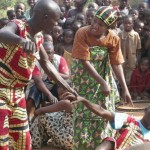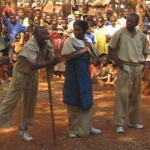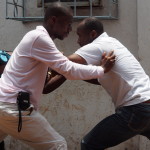The Common Ground Blog is an initiative of (Search for Common Ground), an international non-governmental organization (NGO), headquartered in Washington and Brussels, whose mission is to transform the way the world deals with conflict - away from adversarial confrontation towards cooperative solutions. (more info)
Congo: Tackling child exploitation in schools
By Julia Boccagno
“Hi son, what did you do in school today?”
“Oh, I spent most of the day collecting firewood for Mr. Johnson’s class.”
“What?!”
Imagine finding out your child is forced to work for the school, when he or she should be learning math, grammar, and history… That next parent-teacher conference might get a little heated.
This is exactly what’s happening in the Democratic Republic of Congo.
 Many Congolese children do not have the privilege of attending school because there’s too much work to do at home, such as fetching firewood, carrying water, and tending field crops. Children often become students only because of their parents’ sacrifices. Now the dutiful parents find out their children are doing these same tasks for the school instead.
Many Congolese children do not have the privilege of attending school because there’s too much work to do at home, such as fetching firewood, carrying water, and tending field crops. Children often become students only because of their parents’ sacrifices. Now the dutiful parents find out their children are doing these same tasks for the school instead.
During a long day of learning in the classroom, Congolese children are forced to carry out any job the school administrators demand. If these tasks are not successfully completed, the teachers won’t permit students to return home.
This has provoked heated friction between the parents and teachers.
Seeing the situation escalate, Search partnered with UNICEF to transform the dynamics of conflict in 20 different schools in the Equateur and Katanga provinces. Known as “Peacebuilding and Education,” the project allows students, parents and teachers to come together in a safe and open discussion about educational ethics using participatory theater and scorecard evaluations.
Surrounded by a massive crowd, the participatory theater events raise the public’s awareness of the exploitation of children in schools.  “The student who fails to bring me a bundle of firewood will fail the class,” the teacher-actor proclaimed during an event.
“The student who fails to bring me a bundle of firewood will fail the class,” the teacher-actor proclaimed during an event.
The student-actor vehemently responded, “But we came to school to learn, not to work!”
Participatory theater allows community members, parents, teachers and children to voice their opinions in a non-confrontational way and gain a greater understanding and respect for one another.
Zorrobabel, a student at Bilenge primary school, explains,
“We didn’t perform the play to criticize our teachers or our principal, but rather, to show our community some of the problems that face us in school. I’m happy SFCG introduced this innovative method to our schools.”
To promote further unity, citizens “rate” the quality of the social services in their communities while providers “rate” their own performances as well. Following these scorecard evaluations, the two groups reach common ground by attending a town hall meeting to compare their scores, discuss methods for improvement, and establish committees to monitor the progress.
The DRC’s educational problems are strongly linked to broader governance issues and existing internal conflict. We hope that the “Peacebuilding and Education” program can prepare a new generation of hopefuls and peace-seekers to solve the country’s complicated socioeconomic issues.
_______________________
As a rising American University junior, Julia Boccagno majors in Broadcast Journalism and double-minors in International Studies and Italian with the hopes of becoming a future foreign correspondent. She firmly believes that objective news reporting is a vital tool within the peace and conflict resolution conversation. She is currently the New Media Intern at Search for Common Ground.
Related Posts
from → Success Stories








